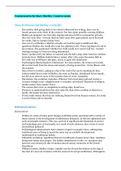Summary
Summary Frankenstein- Mary Shelley, COMPLETE CONTEXT NOTES
This document covers the necessary context notes for the novel Frankenstein by Mary Shelley. Within the OCR exam for the gothic comparison question, context is the heaviest weighting, this document entails how to receive those top band marks.
[Show more]




